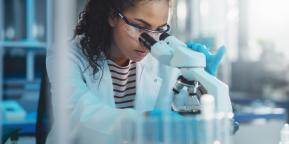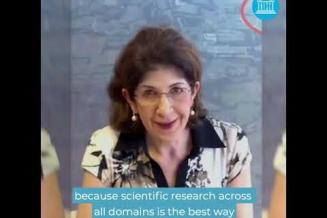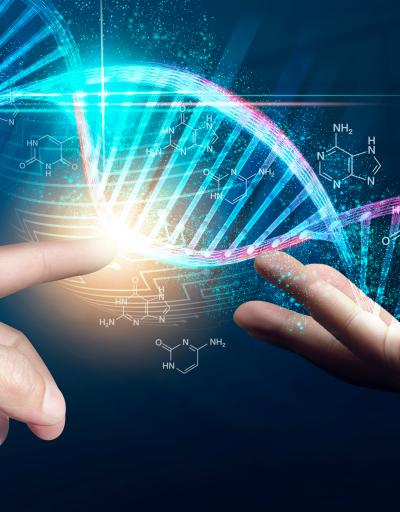
World Science Day for Peace and Development
Celebrated every 10 November, World Science Day for Peace and Development highlights the important role of science in society and the need to engage the wider public in debates on emerging scientific issues. It also underlines the importance and relevance of science in our daily lives.
By linking science more closely with society, World Science Day for Peace and Development aims to ensure that citizens are kept informed of developments in science. It also underscores the role scientists play in broadening our understanding of the remarkable, fragile planet we call home and in making our societies more sustainable.
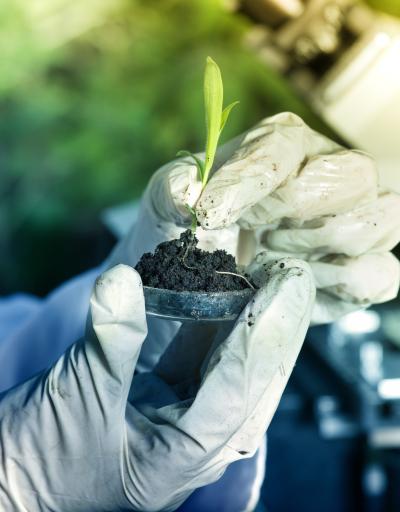
2023 theme and celebration
The theme of World Science Day on 10 November 2023 is: Building trust in science.
The role of science in shaping our collective future can only be fulfilled when there is trust in science. It is trust in science that fuels the development and application of evidence-based solutions to our world’s multifaceted challenges. Trust in science is a complex issue. It affects the way in which scientists operate and the way science is perceived by society. Also, enhancing trust in science strengthens science-based policy decisions and society’s support for their application.
UNESCO’s celebration
"Science holds the undeniable potential to change our world for the better. Vaccines, for instance, have played a critical role in curbing the spread of diseases such as COVID-19, measles, and polio. Innovations in energy and agriculture have led to increased crop yields while reducing the use of pesticides, fertilizers, and water. Central to these breakthroughs is scientific research, which drives all major leaps in understanding."
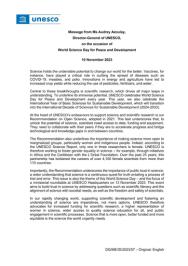
The poster is vailable in the 6 official UN languages (English, French, Spanish, Arabic, Chinese, Russian), as well as a blank version to accommodate other languages.
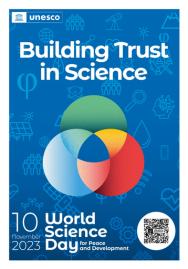
Participate in World Science Day 2023
World Science Day is co-ordinated each year by UNESCO, which is also the lead United Nations agency for sciences and the International Year of Basic Sciences for Sustainable Development.
Scientists, science communicators and science enthusiasts are encouraged to prepare their own events to celebrate World Science Day. To this end, UNESCO has prepared a poster which may be downloaded or printed in Arabic, Chinese, English, French, Russian and Spanish. There is also a blank version which may serve as the basis for posters in other languages.
The following are some suggestions of how you can contribute to World Science Day through your institution:
- If you are a researcher, organize an open day for the public at your university or research centre with an accompanying programme; this programme may include activities such as:
- a tour of your laboratories and other facilities dedicated to basic research for the general public and/or for middle- and high-school pupils that includes a hands-on experience or demonstration of your work;
- a series of popular lectures, such as in the conversational format of TED talks.
- If you are a science popularizer, organize an exhibition at your science museum or science centre on the theme of basic science for sustainable development, or one component of basic science, such as how basic research in chemistry can foster sustainable development;
- If you are either of the above or simply a science enthusiast, record a short video explainer with concrete examples of the ways in which basic science has contributed to sustainable development and post this video on social media.
You may have your own ideas. Please share them with us, so that we can include these on our webpages. Your ideas may inspire others!
"Today, on World Science Day for Peace and Development, let’s harness the potential of open science – not only to limit the impact of climate change, but also to shape a fairer and more peaceful world. Because we succeed or fail together, and we cannot afford to fail."

Read more

About World Science Day
From the universe expanding to the phones in our pockets, science is everywhere. Each year, on 10 November, the World Science day for Peace and Development helps us remember this fact and offers an opportunity for everyone to engage in scientific debates and activities.
The Day marks an occasion to mobilize all actors around the topic of science for peace and development – from government officials to the media to school pupils. By linking science more closely with society, science is made accessible to all and broadens our understanding of the remarkable, fragile planet we call home. It becomes also a more solid stepping-stone towards making our societies more sustainable.
Since its proclamation by UNESCO in 2001, World Science Day for Peace and Development has generated many concrete projects, programmes and funding for science around the world. The Day has also helped foster cooperation between scientists living in regions marred by conflict, one example being the UNESCO-supported creation of the Israeli-Palestinian Science Organization (IPSO).
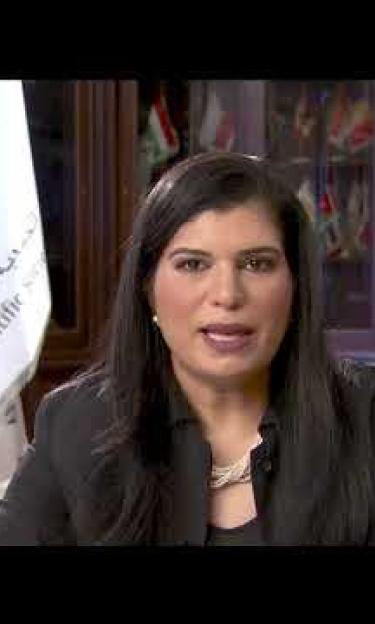
The objectives of World Science Day for Peace and Development are to:
Science, a human right
Everyone has a right to participate in and benefit from science. We must find ways to improve access to science and to the benefits of science for sustainable development.
Universal Declaration of Human Rights
The Declaration was proclaimed by the United Nations General Assembly in Paris on 10 December 1948 as a common standard of achievements for all peoples and all nations. It sets out, for the first time, fundamental human rights to be universally protected. Article 27 states that:
(1) Everyone has the right freely to participate in the cultural life of the community, to enjoy the arts and to share in scientific advancement and its benefits.
(2) Everyone has the right to the protection of the moral and material interests resulting from any scientific, literary or artistic production of which he is the author.
UNESCO Recommendation on Open Science
Open science is a set of principles and practices that aim to make scientific research from all fields accessible to everyone for the benefits of scientists and society as a whole. Open science is about making sure not only that scientific knowledge is accessible but also that the production of that knowledge itself is inclusive, equitable and sustainable.
The UNESCO Recommendation on Open Science provides an internationally agreed definition, as well as a set of shared values and guiding principles for open science. It also identifies a set of actions conducive to a fair and equitable operationalization of open science for all at the individual, institutional, national, regional and international levels.
UNESCO Recommendation on Science and Scientific Researchers
The UNESCO Recommendation on Science and Scientific Researchers is an important standard-setting instrument which not only codifies the goals and value systems by which science operates, but also emphasizes that these need to be supported and protected if science is to flourish. A first Recommendation was adopted in 1974, and a revised Recommendation was adopted on 13 November 2017, superseding the 1974 text. This Recommendation has a particular value today, including for developing countries in building up their scientific skills and institutions.
The Recommendation upholds the principles of the Universal Declaration of Human Rights - that everyone has the right to participate in and benefit from science - and provides a useful checklist of political and institutional requirements to ensure access to science education, and fundamental rights such as the right to be a scientists, to protect intellectual property, to share scientific advancements and accademic freedom.


